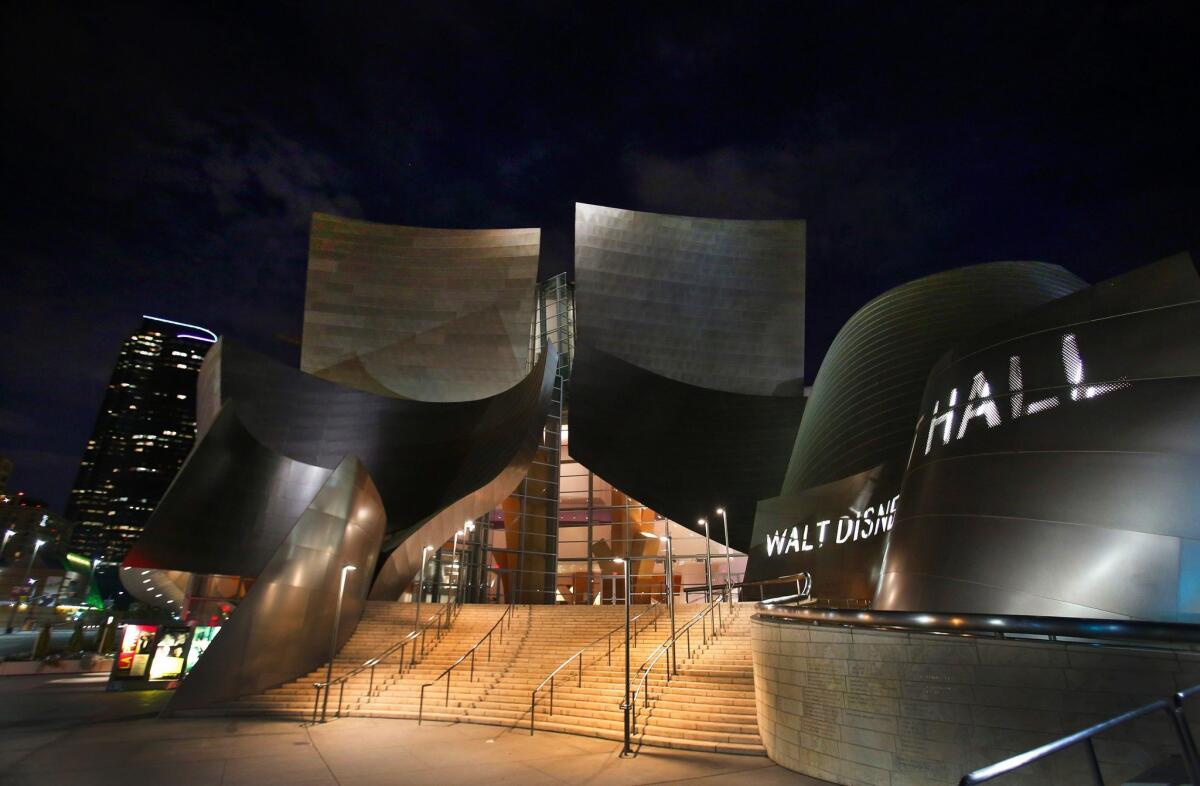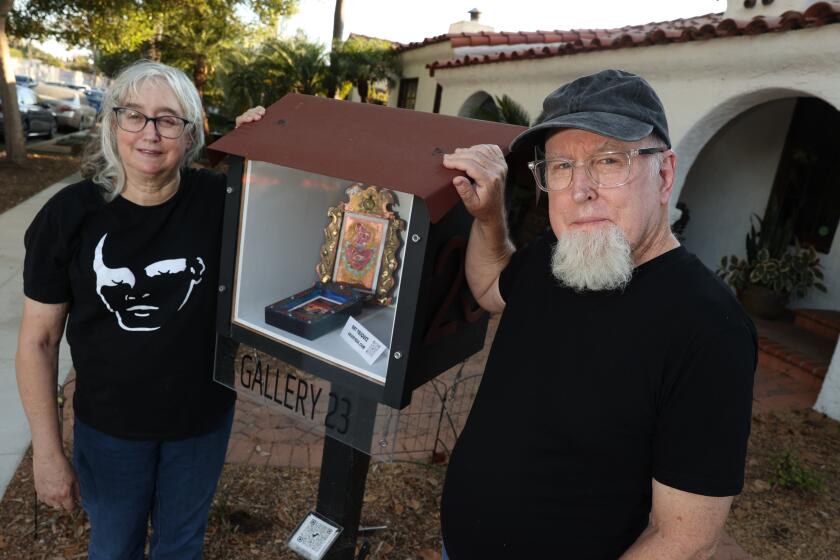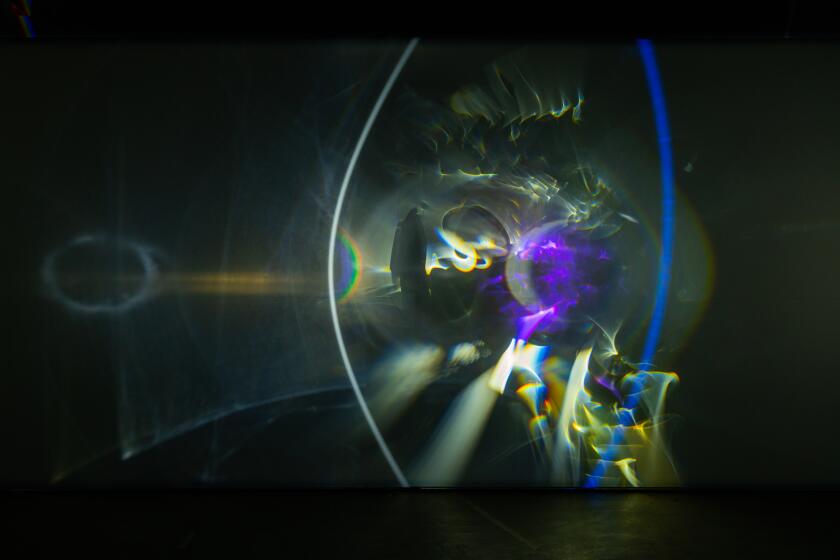Review: L.A. Phil chamber players start Next on Grand in here and now

Walt Disney Concert Hall.
The Los Angeles Philharmonic’s Next on Grand festival, which began Tuesday night in Walt Disney Concert Hall, is meant to be a monthlong inquiry into the contemporary American scene, including the intersection of orchestral music with dance, theater, architecture and pop culture. Los Angeles Opera, the Music Center’s dance program and the new music collective wild Up are collaborating.
The emphasis is on three decades of Minimalism and its consequences. A great deal will be new. There are, in all this, determined curatorial hands, particularly from the orchestra’s creative consultant, John Adams, who conducts a Green Umbrella concert of mostly premieres by emerging composers on Tuesday that has all the newsworthy aspects of a festival kickoff.
------------
For the Record
May 26, 1:53 p.m.: A May 21 Calendar section review of a Los Angeles Philharmonic chamber music concert misspelled the last name of violinist Mark Kashper as Kaspher.
------------
Yet the official kickoff Tuesday came under a different umbrella. It was the final program in the L.A. Phil’s chamber music series. Here orchestra musicians, whose job is generally to play what someone else selects, pick the pieces themselves.
There was not a Minimalist or post-Minimalist in sight, or sound. Age was favored over youth. Two noted senior composers, Yehudi Wyner and Joan Tower, are also distinguished educators. Tower at Bard College and Wyner at Yale, in fact, happened to have been either mentors of the younger generation favored in the Next on Grand festival or targets for rebellion.
Two major film and television composers were included. The one Modernist and the only composer under 65 was the orchestra’s principal timpanist, Joseph Pereira.
But whatever they lacked in vision, the players compensated for in commitment. Principal trumpet Thomas Hooten and associate principal James Wilt opened the concert with Verne Reynolds’ “Calls and Echoes,” a slight yet virtuosic duo by a horn player who taught at Eastman School of Music and died in 2011 (the chamber concert did not, as the rest of the festival will, rely exclusively on living composers). But the performance was astonishing. The call and response could be a brilliant fraction-of-a-second give-and-take or patiently long calls, with one player moving offstage.
The 85-year-old Wyner was the firm pianist in his quartet “Tants and Maysele” for clarinet (David Howard), violin (Mark Kaspher) and cello (Barry Gold). A tribute to his composer father, Lazar Weiner (a specialist in Jewish music), this two-movement “dance” and “story” has the quality of a Chagall-like mix of musical Cubism and Fauvism, in which Jewish melodic phrases operate in engagingly changeable settings.
The compositional language of Pereira’s “Strophe,” played by Pereira and L.A. Phil string players (including Minyoung Chang, who is married to Pereira), is more contemporary than Wyner’s, but again shape and color mattered most. Sprung rhythms and jagged melodies bounced from the vibes to strings and back. In the central of the three sections, bowed vibe created a silvery glow of overtones that was picked up by the string quartet and used sound as a light switch to make a darkened Disney appear to glisten.
After intermission two works for brass quintet by film composers surrounded Tower’s First String Quartet, “Night Fields.” What these dissimilar pieces had in common was a sense of American majesty. For Tower this is the disconcerting radiance of wheat fields on a cold and windy night made golden by a full moon. Vivid color and balletic movement have always been Tower’s greatest powers, and her quartet operates with an infectiously listenable flow.
Michael Kamen’s brief Quintet, written for Canadian Brass, is a sweet meditation. Bruce Broughton’s “Three American Portraits” is more curious.
The Americans are Napoleon Hill, who founded the self-help movement with his positive mental attitude at the turn of the last century, as well as Calvin Coolidge and William Tecumseh Sherman. The brass quintet, thus, executes, in turn, a gung-ho expression of positivity, languid lyricism for Silent Cal and adamant attacks to characterize the Civil War general.
The festival opener, then, may not have said much about what’s next on Grand or the current American scene. But it told plenty about what’s currently on Grand. Were the L.A. Phil to create a brass quintet, it could be stellar. Both string ensembles had the polish and connectivity of major string quartets.
Twitter: @markswed
More to Read
The biggest entertainment stories
Get our big stories about Hollywood, film, television, music, arts, culture and more right in your inbox as soon as they publish.
You may occasionally receive promotional content from the Los Angeles Times.











